Letter from Newton Tarkington to Charles Sellers

Newton Tarkington writes to Charles Sellers with advice on the attribution of a portrait of painter Benjamin West.


Newton Tarkington writes to Charles Sellers with advice on the attribution of a portrait of painter Benjamin West.
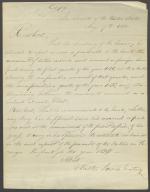
Walter Lowrie, Secretary of the United States Senate, sends Treasury Secretary Roger B. Taney the Senate's request for a report on foreign imports.

Harriet Beecher Stowe writes to Susie Howard and apologizes for "neglect." "I was so unwell and Mr. Stowe so unwell... that nobody ought to have expected any thing of me," as Stowe explains.

Secretary of State John Quincy Adams writes to Ebenezer Huntington, an attorney, to inform him that the USS John Adams has been sent to Havana with "purpose of procuring the Release of such Citizens of the United States, including Captain

Secretary of State Thomas Jefferson writes to William Short, the US minister to the Netherlands, with instructions regarding his duties as treaty commissioner to Spain.
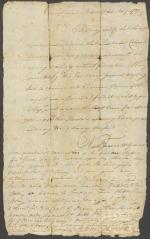
Major General Nathanael Greene and Colonel Richard Humpton, both officers in the Continental Army, write Lieutenant Colonel Francis Gurney to certify that he is innocent of providing any support or information to the United Kingdom.
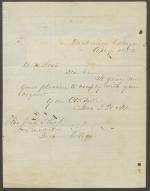
Jesse Peck, President of Dickinson College, responds to A. W. Foote's request for an autograph.

General Zachary Taylor writes to Roger Jones, the Adjutant General of the Army, regarding "Indian troubles on frontiers of Texas" and suggesting that the investigation into the Texas frontier "be made under the direction of the officer assigned to

John Adams, a delegate to the Second Continental Congress, writes to Abigail Adams on the state of creating a new country.

Albert Slape writes to James Munroe with news of the dismissal of four students on the charge of tarring Professor Henry Otis Tiffany's blackboard.
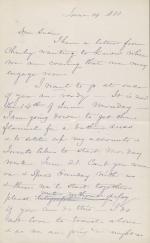
Harriet Beecher Stowe writes Susie Howard to discuss plans for their trip to Saco, Maine. Stowe also mentions the possibility of stopping at a Mrs. Claflin's house during the trip. "She will be delighted to see you," as Stowe explains.
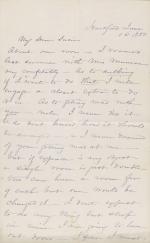
Harriet Beecher Stowe writes Susie Howard and discusses plans for their trip to Saco, Maine.
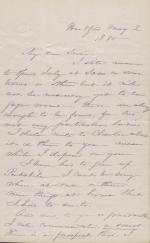
Harriet Beecher Stowe writes to Susie Howard and asks for help in buying a layette for her first grandchild as well as discusses plans for their upcoming trip to Saco, Maine. Stowe also mentions how she "had to give up going" to another city.

Thompson Prettyman Ege writes to his father, Oliver Ege, with updates on his life as a student and interactions with people in Carlisle.

Charles C. Carter writes to his mother about his life in Carlisle. While "Carlisle is not as big as our town," Carter explains that "it is a great deal prettier" than Decatur, Illinois. Carter also describes Dickinson College's campus.

Henry Martyn Harman writes to his father, Andrew Harman, about classes starting at Dickinson.

John Robert Kennaday writes to several members of his family about life as a student at Dickinson.

Samuel Henry Reynolds, a member of the Class of 1850, writes to his Mother about his health, conditions in Carlisle, and asks that his father send money for medicine.

Samuel Miller (Class of 1874) writes to his brother, David Miller, about his room and his class schedule at Dickinson. While his "first impressions of life at Coll.

Josephine Meredith writes to Josephine Davis about a recent visit to Dickinson, her extended family, her life and activities in Iowa, and comments on health issues.

Cyrus W. Trimble writes to his brother, John A. Trimble about his daily schedule at Dickinson and the two different literary societies at Dickinson, the Union Philosophical Society and the Belles Lettres Society.

Joe Belford (Class of 1871) writes to George, his friend from Dickinson College, about life as a student in Carlisle as well as a local fair.

Charles F. Deems thanks Mrs. Lausing Thurber for her "kind note" and asks for her attention "to Frank Leslie Sunday Magazine." Deems, a member of the Class of 1839, explains how he is "now editing" that publication.
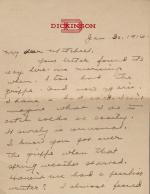
An unknown student at Dickinson College writes to a Mitchell about the winter and getting ready for the fraternity dances that take place in February.

Pennsylvania Supreme Court Chief Justice John B. Gibson writes to Mr. Johnson about changing the laws of Pennsylvania.